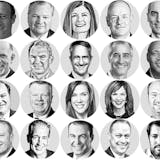Al Baker and his business co-creator Muhammad Abdurrahman entered into business with noble intentions.
The two created Reemo, formerly Playtabase, to help Abdurrahman's father live more independently after severe strokes limited his mobility. The mobility impaired have a high cost for every motion — to pick up a remote that's dropped to the floor is to risk a life-threatening fall, Baker said. Their solution: wearable technology that would control home devices using simple gestures.
Baker and Abdurrahman started Minneapolis-based Reemo in 2012. The company originally was developing its own wrist-worn device to provide basic inputs. Now, the company has largely given up on developing its own hardware, switching efforts to Reemo Engine software that would work on several different smartwatches.
"It's always available, it's always mobile, you don't have to drop it, and you can forget about it if you don't want it," Baker said of the Reemo Engine-powered smartwatch he wore to demonstrate its capabilities in his studio apartment in St. Paul.
The system works by downloading an app to a smartphone or tablet that aids in setting up Reemo pods — Bluetooth receivers paired to each controlled device or devices. The app drives users or caregivers through the process of pairing the smartphone with the pod-controlled smart devices. The smartwatch then becomes the easy-to-use input device to turn devices on and off and control other functions through six or seven deliberate motions.
"When we got started there weren't a lot of home automation systems, there weren't a lot of wearables," Baker said. "So we just started building our own."
Reemo was a winner in the 2014 AgePower Tech Search competition run by MOJO Minnesota and Ecumen, which operates a variety of senior housing options.
Eric Schubert, Ecumen's vice president of strategic initiatives, met the Reemo partners during the competition, but before the company was ready to take advantage of the pilot study opportunity that came with the award. He is convinced technology can help people live independently longer and that technologies in development are critical to helping people maintain independence.


